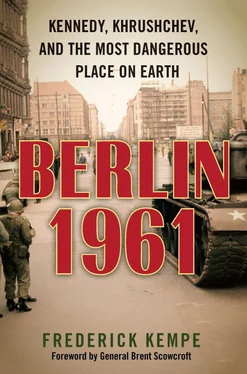Khrushchev insisted to Humphrey that by solving the Berlin problem, he and Eisenhower could improve their personal relationship and together achieve a historic thaw in the Cold War. And if the U.S. president didn’t like the details of his Berlin plan, Khrushchev told Humphrey, he would be open to a counterproposal. Khrushchev said he could accept any alternative suggestions from Eisenhower as long as they didn’t include either German unification or “the liquidation of the socialist system in East Germany.” For the first time, he was painting his red lines for any Berlin talks.
Khrushchev shifted so rapidly between seduction and threats that Humphrey was reminded of his father’s treatment for chilblains back in South Dakota, which involved the frequent shifting of his feet between hot and cold water. “Our troops are there not to play cards, our tanks are not there to show you the way to Berlin,” Khrushchev blurted to Humphrey at one point. “We mean business.” At the next moment, however, the Soviet leader’s eyes would moisten as he spoke with dripping sentimentality about losing a son in World War II and his affection for President Eisenhower. “I like President Eisenhower,” he told Humphrey. “We wish no evil to the United States or to Berlin. You must assure the President of this.”
Eisenhower responded to Khrushchev’s Berlin ultimatum just as the Soviet leader had hoped. He signed on to a four-power foreign ministers’ meeting in Geneva, which East and West German representatives would attend as observers. Although progress there proved disappointing, Eisenhower thereafter invited Khrushchev to be the first Soviet Communist Party leader to visit the United States.
Khrushchev congratulated himself, considering Eisenhower’s agreement to receive him in the capitalists’ lair “as a concrete result of the Berlin pressure he had been exerting on the Western powers.”
He felt he had finally extracted from America the respect he so profoundly craved for himself and his homeland.
KHRUSHCHEV’S U.S. VISIT
SEPTEMBER 15–27, 1959
As the departure date for his trip to America drew closer, Khrushchev grew increasingly concerned that his hosts were planning a “provocation,” a damaging slight upon his arrival or at other points during his visit. That in turn could be used against him at home by his now silenced but far from vanquished rivals as evidence that his high-profile U.S. visit was both naive and harmful to Soviet interests.
For that reason, Khrushchev’s considerations about how he would negotiate Berlin’s future in the U.S. were secondary to his scrutiny of every aspect of the itinerary to ensure he didn’t suffer what he referred to as “moral damage.” Though Khrushchev was a communist leader ostensibly representing the proletariat vanguard, his advance team demanded that he be treated with the pomp and circumstance of a visiting Western head of state.
Khrushchev balked, for example, when he learned his most crucial talks with Eisenhower would occur at a place called “Camp David,” a place none of his advisers knew and which sounded to him like a gulag , or internment camp. He recalled that in the first years after the Revolution, the Americans had brought a Soviet delegation to Sivriada, in the Turkish Princes’ Islands, where the stray dogs of Istanbul had been sent to die in 1911. Thinking to himself that “the capitalists never missed a chance to embarrass or offend the Soviet Union,” he feared “this Camp David was… a place where people who were mistrusted could be kept in quarantine.”
Khrushchev only agreed to the meeting after his advance team, following investigation, reported that the Camp David invitation was a particular honor, as Eisenhower was taking him to a country dacha built by Roosevelt in the mountains of Maryland during World War II. Khrushchev would later express shame about how the episode revealed Soviet ignorance. More important, however, was what it said about the potent mixture of mistrust and insecurity with which Khrushchev approached every aspect of his relationship with the U.S.
Disregarding the advice of his pilot, Khrushchev flew across the Atlantic in a still-experimental Tupolev Tu-114, which had not yet passed its required tests and had microscopic cracks in its engine. Despite the risks, Khrushchev insisted upon this means of travel, as it was the only aircraft in the Soviet fleet that could reach Washington nonstop. He would thus arrive aboard a plane that had the world’s largest passenger capacity, longest range, greatest thrust, and fastest cruising speed. That said, Soviet fishing boats, cargo ships, and tankers formed a line under the plane between Iceland and New York as a potential rescue party should the engine fissures expand and force a crash landing at sea.
Khrushchev would recall later that his “nerves were strained with excitement” as he looked from the window of his plane as it circled over its landing area and he considered the trip’s deeper significance: “We had finally forced the United States to recognize the necessity of establishing closer contacts with us…. We’d come a long way from the time when the United States wouldn’t even grant us diplomatic recognition.”
For the moment, Berlin was an afterthought to this larger national purpose. He relished the notion that it had been the might of the Soviet economy, its armed forces, and the entire socialist camp that had prompted Eisenhower to seek better relations. “From a ravaged, backward, illiterate Russia, we had transformed ourselves into a Russia whose accomplishments had stunned the world.”
To Khrushchev’s relief and delight, Eisenhower greeted him at Andrews Air Force Base outside Washington, D.C., with a red carpet and a twenty-one-gun salute. Khrushchev would later recall that he was “immensely proud; it even shook me up a bit…. Here was the United States of America, the greatest capitalist power in the world, bestowing honor on the representative of our socialist homeland—a country which, in the eyes of capitalist America, had always been unworthy or, worse, infected with some sort of plague.”
It was more a result of this improved mood than any deeper Berlin strategy that moved Khrushchev to tell President Eisenhower during their first meeting on September 15 that he would like to “come to terms on Germany and thereby on Berlin too.” Without providing further details, Khrushchev said, “We do not contemplate taking unilateral action.” For his part, Eisenhower called the Berlin situation “abnormal,” language the Soviet leader considered encouraging for Berlin talks that would come at the end of the trip.
The coast-to-coast journey that followed was marked by dramatic highs and lows that illustrated both sides of Khrushchev’s complex emotional relationship with the U.S.: the eager suitor seeking approval from the world’s greatest power, and the insecure adversary scanning for the slightest offense.
He and his wife, Nina Petrovna, sat between Bob Hope and Frank Sinatra during a lunch at Twentieth Century–Fox, at which Marilyn Monroe wore her tightest dress, but the Soviet leader railed like a spoiled child at being denied entry to Disneyland—wondering whether it was because the amusement park had cholera or a missile launching pad. Khrushchev saw conspiracy in the choice of Russian-born Jewish movie mogul Victor Carter as his Los Angeles escort, blaming much of what went wrong in the city on the evil intent of the émigré whose family had fled Rostov-on-Don.
His trip had nearly ended on his first day in California, when Khrushchev struck back at conservative Los Angeles Mayor Norris Poulson during a late-night speech at a star-studded banquet. Looking to score domestic political points, the mayor had refused the appeal of Henry Cabot Lodge Jr.—the U.S. ambassador to the United Nations and Khrushchev’s companion throughout the trip—that he remove anticommunist lines that the Soviet leader would find offensive. “It took us only twelve hours to get here,” Khrushchev said in response, asking that his plane be prepared for departure. “Perhaps it will take us even less time to get back.”
Читать дальше











